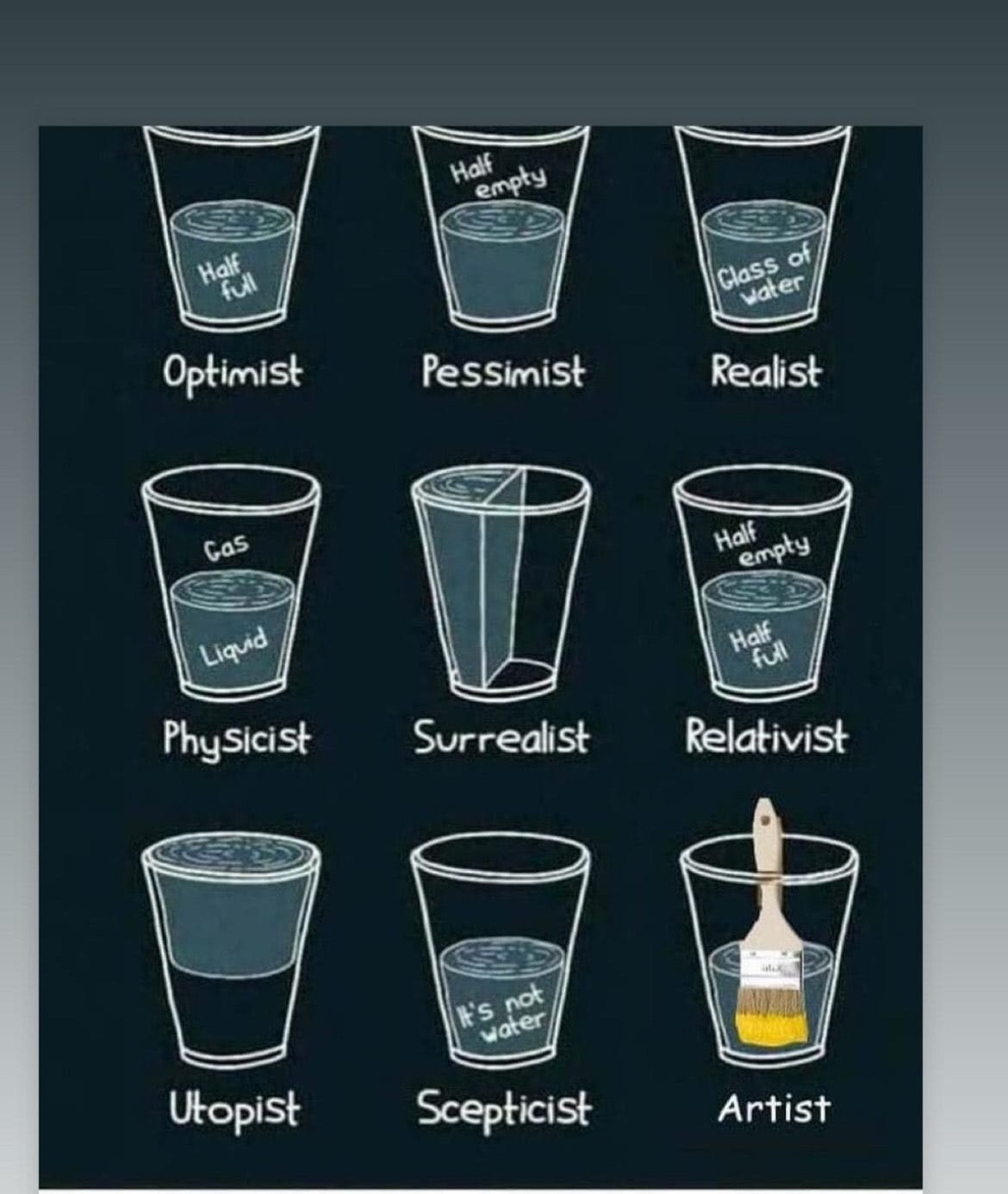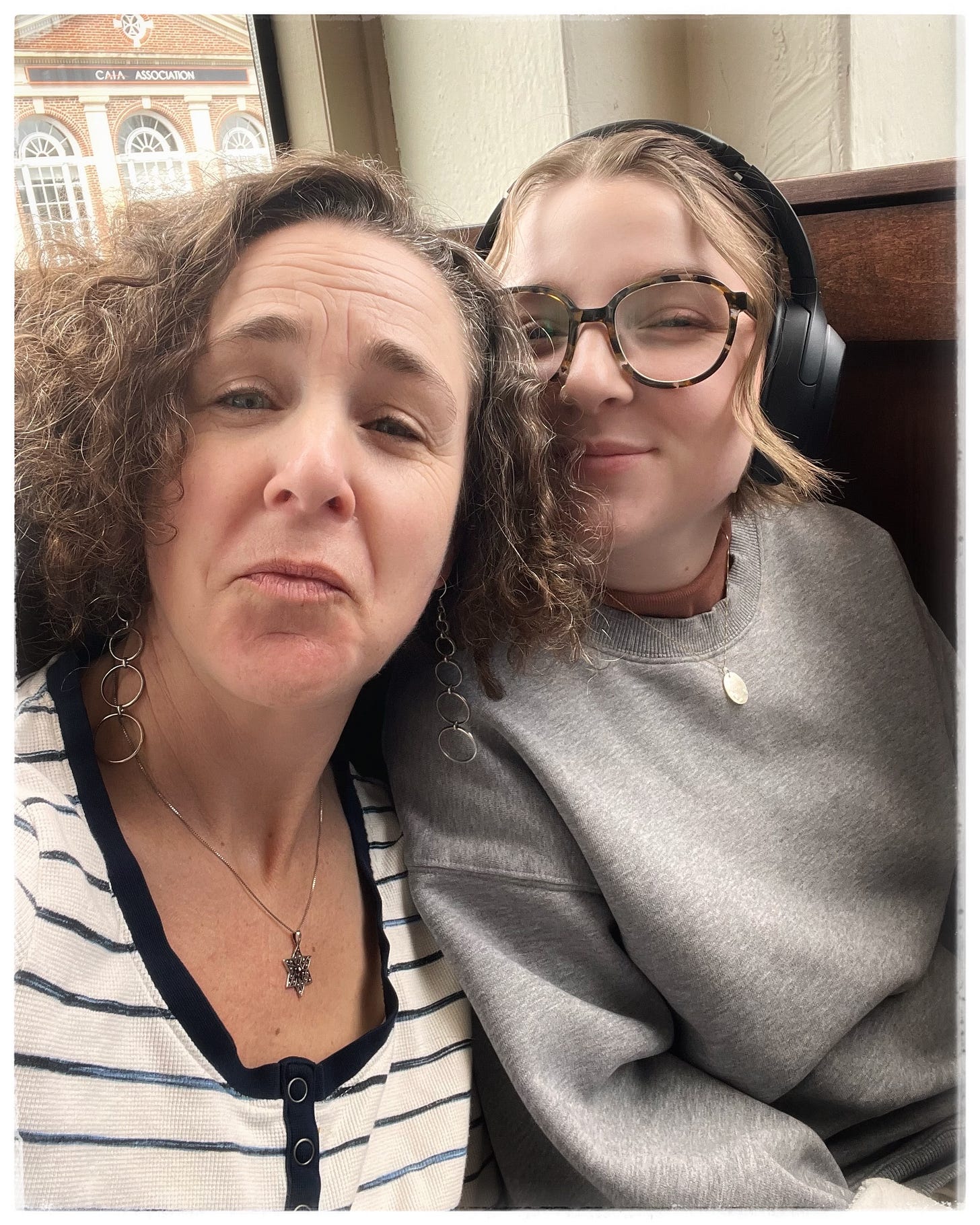11 things after a meme I saw on Instagram
Is your glass half-empty, half-full... or full of paintbrushes?
I shared an image the other day that had nine glasses of water, each labeled according to perspective or personality type. There are the usual ones – Optimist (half full), Pessimist (half empty), some alternatives, like Realist (glass of water), Physicist (liquid, gas), and Relativist (half full, half empty). We have the extremes of Utopist (empty on the bottom half, full on the top half – that one took me a moment) and Skeptic (“it’s not water”). There's the Surrealist, defying description. And finally, in the bottom right corner, we see the Artist (a paintbrush in the glass of water).
I wonder if most people identify with one of these more than all the others, most of the time, or if it changes depending on the situation.
Do we have a true nature, the way we relate to the world that is the most “us”? I feel like this is like asking, does a boulder have a true shape, unaffected by the forces of the ocean, wind, and rain (not to mention, potentially, humans).
We, too, are all shaped by outside forces. To write this seems almost silly. Of course we are! Duh! We are born! I mean, to a degree, we are shaped by outside forces even before birth; from nutrition to emotional state, everything passes through the placental wall.
Is this the part where I tell you about my pregnancies?
I’m writing in a coffee shop where I’m co-working with Aviva. Naturally, we took a bunch of selfies. Here’s one of them. Isn’t she cute?
I would like to be an optimistic artist. I have a hard time with chronic skeptics and pessimists (probably because anxiety can at times bring out a pessimistic quality that I don’t love in myself). My dad is a die-hard optimist. It’s a wonderful thing about him, and also at times maddening. Take, for example, the time last spring he and my mom got Covid. At one point, he emailed us all a photo of a very faint positive test and wrote something like, “See? It’s barely Covid. We’re basically fine!” Or the many times when we’ve debated just how bad things are in the U.S., with him insisting on how much progress the country has seen and me insisting that this optimism was evidence less of progress and more of his privilege. Some of this is no doubt generational – the younger folks are sure they know better while the elders lend perspective.
As we both grow ever older and as the world turns, I have come to appreciate my father’s unending optimism more and more. He is one of my biggest cheerleaders. After all, his advice to “keep going” has become a cornerstone of my work and life. Recently, I sent him a piece of writing that erred heavily on the heavy side of things; it had to do with things like college students having mezuzot ripped from door frames in their dorms. He wrote back and said something about lightening up. Then he called a few minutes later to tell me he hadn’t meant it to be flippant, but that we have so much good stuff going on and coming up, and he didn’t want me to miss that. Instead of being annoyed, I appreciated his self-awareness and encouragement to see my glass as half full, which it very much is.
Isn’t it funny, how being told to lighten up can be such an affront, and it can also be a message of love? Maybe this all depends on context and delivery… I know impact matters more than intention, so the conventional wisdom goes. But I can’t help but think intention matters, too. (Does this make me a relativist?)
Earlier, I washed out some paintbrushes. I still haven’t developed a regular art-making practice, but I’m working on it. “Have you made art about it?” is a central question in the Jewish Studio Process (JSP), of which I am becoming a certified facilitator. When I made a big Monday morning to-do list, I included “Make art about it” as an item. The “it” of today won’t be the “it” of tomorrow, but if there is one thing I can count on, it’s that there will be an “it” to make art about. A question, an idea, a fear, an uncertainty, a problem, a sticky wicket, a possibility, an emotion, a dream.
For me, the Artist glass offers something none of the others do: Freedom. We might begin with only the vaguest notion of “about,” and that is not only ok, it’s very much the point. I have long loved a line of poetry by Heather McHugh: “Poetry is not about about.” With poetry, like art-making, like writing 11s or freewriting in general, the process is the point. I don’t have to make some determination, in advance or ever, about good or bad, full or empty, relative or otherwise. I can set an intention, like a prayer that has already been answered, drop below so much cognitive effort and move my brush across the canvas or my hand across the page, and let something emerge. I can then sit back and witness my own creation, allowing it to reflect or speak back to me and show me something perhaps I hadn’t seen before. Or maybe it won’t reveal anything, or maybe I will notice my own self-judgment, and this in turn will remind me that everything counts when it comes to practice. Maybe then I will rinse my glass, clean off my paintbrushes, and consider what kind of world we might live in if we widened our definition of who gets to call themselves an Artist.
Are you a Jewish writer seeking community and accountability?
Registration is open for the spring session of Jewish Jewels on the Path, which begins on April 15 and runs for 12 weeks. This is a mostly asynchronous group, with a gentle but consistent weekly rhythm, encouragement to keep going, and the support of a small, warm community of fellow travelers.
Details and registration: www.jenaschwartz.com/jewish-jewels
Reach out to me if you have questions!








Point 3 blew my mind in a good, no, a fabulous way!